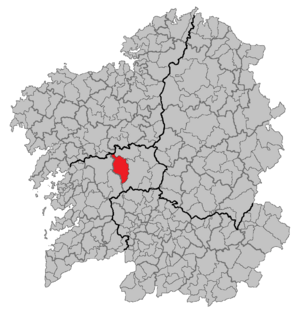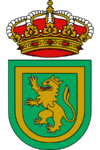Silleda facts for kids
Quick facts for kids
Silleda
|
|||
|---|---|---|---|
|
|||

Location of Silleda within Galicia
|
|||
| Country | |||
| Autonomous community | |||
| Province | Pontevedra | ||
| Comarca | O Deza | ||
| Government | |||
| • Type | Mayor–council | ||
| • Body | Concello de Silleda | ||
| Area | |||
| • Total | 169 km2 (65 sq mi) | ||
| Population
(2018)
|
|||
| • Total | 8,698 | ||
| • Density | 51.47/km2 (133.3/sq mi) | ||
| INE | |||
| Time zone | UTC+1 (CET) | ||
| • Summer (DST) | UTC+2 (CEST) | ||
| Website | http://www.silleda.es | ||
Silleda is a cool town in the province of Pontevedra, located in the amazing region of Galicia, Spain. It's part of an area called O Deza, which is like a local district. Silleda is known for its beautiful nature and lively fairs.
Contents
Getting to Silleda
Silleda is easy to reach! It's right next to the N-525 road. This road connects the city of Ourense with Santiago de Compostela, which is the capital of Galicia. Silleda is only about 40 kilometers (25 miles) from Santiago.
You can also get there using the AP-53 highway. This highway also links Santiago de Compostela and Ourense. So, whether you're coming from the north or the south, Silleda is well-connected.
What Defines Silleda's Borders?
Silleda is surrounded by some really cool natural features. The Serra do Candán is a mountain range that helps define its edges. There are also the mountains of Chamor and San Sebastián de Meda.
Two important rivers, the Ulla and the Deza, also mark the municipality's boundaries. Silleda shares its borders with other towns too. To the north and east, it's next to Vila de Cruces. To the east and south, you'll find Lalín. And to the west, it borders A Estrada and Forcarei.
How Silleda is Organized
Silleda covers an area of 169 square kilometers (about 65 square miles). This area is divided into 33 smaller parts called parishes. Each parish often has its own special patron saint.
These parishes include places like Abades, Ansemil, Breixa, and many more. Some of the names are Carboeiro, O Castro, Cervaña, Chapa, Cira, and Cortegada. You can also find Dornelas, Escuadro, Fiestras, Graba, Lamela, and Laro. Other parishes are Manduas, Margaride, Martixe, Moalde, Negreiros, Oleiros, Parada, and Pazos. Finally, there are Piñeiro, Ponte, Refoxos, Rellas, Saídres, Siador, Silleda, Taboada, Vilar, and Xestoso.
Silleda's Economy and Attractions
Silleda is famous for its big cattle and farming fairs. The most well-known is the Semana Verde de Galicia, which means "Green Week of Galicia." This international fair brings in lots of visitors from all over the world. It takes place in a special fairground that has one of Europe's largest covered streets!
The town is always growing. New roads and an industrial area outside the town have helped it develop.
Silleda also has cool places to visit. You can explore the ancient Romanesque Monastery Carboeiro. For nature lovers, there are the Fervenzas do Toxa. This is one of the tallest waterfalls in Spain, and it's truly amazing to see!
Fun Festivals in Silleda
Silleda loves to celebrate with many festivals throughout the year!
- Party of the Pie: This yummy celebration happens on the third Saturday in August.
- Doughnut Festival: If you love doughnuts, visit on Easter Sunday!
- Party of the Tortilla: Enjoy delicious Spanish tortillas on the Friday of the first week in August.
- Ham Festival: This tasty event takes place on the second Friday of June.
- Chestnut Festival: A cozy festival in November, perfect for autumn.
- Paella Festival: A celebration of the famous Spanish rice dish.
- Festival Cauldron Beef: This unique food festival is usually held in March or April.
See also
 In Spanish: Silleda para niños
In Spanish: Silleda para niños
 | Toni Morrison |
 | Barack Obama |
 | Martin Luther King Jr. |
 | Ralph Bunche |




